Uncertainty
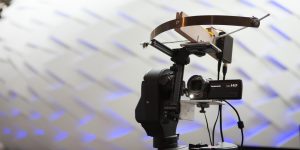
#festivalstories
Lennard Barth (AT), Celine Fahrngruber (AT), Samuel Gerersdorfer (AT), Joshua Haiden (AT), Elias Illig (AT), Sophie Kaufmann (AT), Irina Pitterle (AT) Xaver Quintus (AT)
Junge Filmemacher*innen, junge Talente, Young Professionals sind aufgefordert, Minidokumentarfilme zu drehen, die ihre Perspektiven und Eindrücke von den Themen des Festivals festhalten. Anstelle einer allgemeinen Festivaldokumentation werden acht Kurzgeschichten produziert, die verschiedene Slots und Protagonist*innen enthalten.
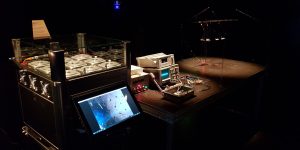
From Art to Innovation: Do They Really Need Us?
Gašper Beg (SI), Luka Frelih (SI), Miha Horvat (SI), Janez Janša (SI), Jurij Krpan (SI), Marko Peljhan (SI/US), Irena Pivka (SI), Marko Pritržnik (SI), Peter Purg (SI)
Despite the widely embraced opinion that involving artists and creatives in innovation processes contributes to better results, very few research and development platforms are employing artists or art thinking in their innovation teams. Die talk's participants will discuss the challenges for artists, scientists, engineers and entrepreneurs stemming from essentially non-existing collaborative/open innovations.
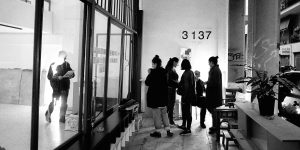
Creative Question Challenge: Hybrid forms of being together
3 137 (GR), Audrey-Flore Ngomsik (FR), Christos Carras (UK/GR)
"Lasst uns beenden, was wir begonnen haben." Auf diese Weise stellt die UNO ihr erstes Ziel für nachhaltige Entwicklung vor - das Ende der Armut in allen Formen und Dimensionen bis 2030. Die 17 Ziele der Nachhaltigen Entwicklung und ihre 169 Teilziele wurden als ein ausuferndes, missverständliches Durcheinander großer Absichten beschrieben. Allein der Titel der Entwicklungsagenda - "Unsere Welt umgestalten" - verströmt utopische Ambitionen. Er wurde 2015 von 193 Nationen angenommen. Fünf Jahre später und mit zehn verbleibenden Jahren: Wie wird sich unsere Welt verändern?
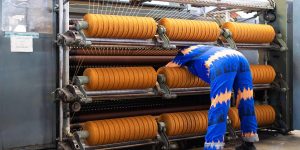
Creative Question Challenge: Examining organic and digital ecosystems
Hypercomf (GR), Markos Digenis (GR)
Will there be no poverty and zero hunger across the world in ten years? Is this planet to be populated in ten years by billions of healthy and educated humans? Is comfortability or autonomy more important to well-being? Can you be comfortably autonomus? These are the questions scientists were asked who applied to an open call to collaborate with artists in the STUDITOPIA residency program.
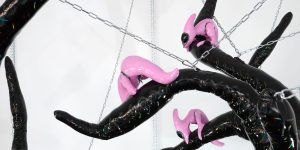
ANYWHERE
During the Ars Electronica Festival visitors in Linz will be transported virtually to Luxembourg to explore the exhibition ANYWHERE by Mary-Audrey Ramirez in Esch-Belval. Through an interactive multimedia experience and real-life online game, the Festival public will be able to discover sections of a retired blast furnace at the site of a former steel plant in Esch

Creative Question Challenge: Human being and "soft" technologies
Christiaan Zwanikken (NL), DM Hoyt (US), Emmanuel Grimaud (FR)
"Lasst uns beenden, was wir begonnen haben." Auf diese Weise stellt die UNO ihr erstes Ziel für nachhaltige Entwicklung vor - das Ende der Armut in allen Formen und Dimensionen bis 2030. Die 17 Ziele der Nachhaltigen Entwicklung und ihre 169 Teilziele wurden als ein ausuferndes, missverständliches Durcheinander großer Absichten beschrieben. Allein der Titel der Entwicklungsagenda - "Unsere Welt umgestalten" - verströmt utopische Ambitionen. Er wurde 2015 von 193 Nationen angenommen. Fünf Jahre später und mit zehn verbleibenden Jahren: Wie wird sich unsere Welt verändern?
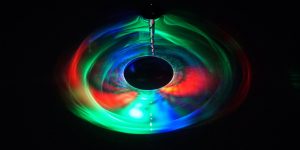
Creative Question Challenge: Between scientific discovery and perceptual expansion
Dmitry Gelfand & Evelina Domnitch (NL/BY), Guillaume Schweicher (BE/LU), Florian Schreck (DE)
Let us finish what we started'. This is how the UN introduces its first Sustainable Development Goal - to end poverty in all forms and dimensions by 2030. The 17 Sustainable Development Goals and their 169 targets have been described as a sprawling, misconceived mess of grandiose intentions. The title of the development agenda itself - 'Transforming our World' - oozes utopian ambition. It was adopted by 193 nations in 2015. Five years later and with ten years left, how do you think our world will transform?
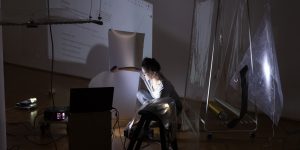
What is Sound – Alpha blending
Luana Lojić (HR)
What is Sound: Alpha blending is an audio-visual performative search for available information on the smallest things and units ever recorded or seen based on internet stored data (ex. bits, nanobes, phonemes, photons, atoms, etc.). Its constant is made of endless improvised medial translations formed from free online available generative tools and starts with a question posed into a search engine, building informational layers of text, sound, pictures and moving images.
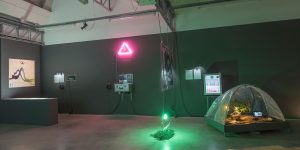
EMAP group exhibition: Quarantine
Robertina Šebjanič (SI), Gjino Šutić (HR), Anna Dumitriu, Alex May (UK), Tiziano Derme, Daniela Mitterberger (AT), Taavi Suisalu (EE), Quimera Rosa (FR/AR/ES), Kat Austen (UK/DE)
Over the last few years, the EMAP/EMARE network of media arts organizations have produced a multitude of works dealing with life-science and cybernetics that examine the fragile ecological equilibrium of life on Earth. A few of these artists find inspiration from scientific discoveries like archaea, a group of unicellular micro-organisms believed to be the oldest form of life on Earth. Other sources of inspiration include the impact of pharmaceuticals on life in the water and the sonic vision of bats. These artistic explorations envision future evolution in magical and often transgressive ways.
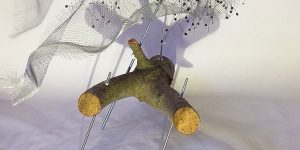
Mutations
The artistic proposal is presented as a curatorial articulation of multiple and heterogeneous work processes, but characterized by mutation. They are processes of works in mutation and on the mutation, like a seismograph of uncertainty. In their various formats, the works will be joined on the website of the UACh Réplica Gallery linked to the Ars Electronica Festival web platform.
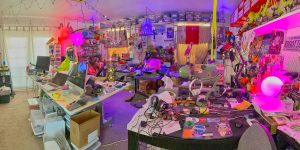
What Matters Now?
Sarah Petkus (US)
Im Zuge der globalen COVID-19-Pandemie wurde das tägliche Leben gestört, wodurch ihm Raum für Veränderungen gegeben wurde; vom Komfort der Routine bis hin zur Energie, die die Schaffung elektronischer und robotergestützter Arbeit antreibt.
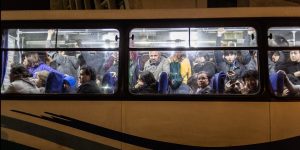
Mutations of the image. The revolt of photography
The first Valdivia International Festival of Photography, Directed by Carlos Fischer, was shaken by the revolt. The photographers changed their workshops on the streets. Lectures mutated. Images too. The abundant photographic material produced during those days in Valdivia, along with the video that reconstructs the convulsed days of the festival, make up an unexpected videogram of the revolt that can be viewed on the online platform of the Replica Gallery associated to UACh's Mutations project.
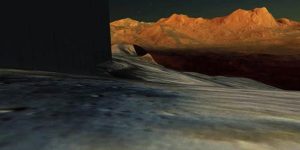
From Glass to Glass to Glass
Nye Thompson (UK)
Für meine neue Arbeit /artefact nahm ich ein großes Gebiet des Mars in Besitz, wobei ich Google Earth und Satellitenvermessungsdaten benutzte, um eine übergroße Grenzmauer um meinen Gebietsanspruch zu bauen. In diesem Video chatte ich mit der Kuratorin Lucy Dusgate, die das Werk ursprünglich in Auftrag gegeben hat, wobei unser keimneutrales, netzwerkgestütztes Gespräch über mein Marsterritorium übertragen wird.
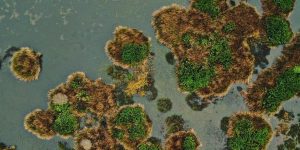
Ecosystem mutations. Wetland Removal.
An 8.5% of the surface area of Los Rios Region in southern Chile is made up of wetlands. Around the city of Valdivia, the presence of wetlands is particularly dense and some areas today are national monuments. A wetland is an ecosystem that is sometimes divided at the surface, but which constitutes a networked ecological continuum. Thus, to alter a part of the wetland is to modify the whole ecosystem. Promoting the convergence of different organizations, the Austral Garden program proposes an aerial route over the geography and natural environment where Universidad Austral de Chile is located. The purpose is that scientists and researchers can share their studies and reflections to spread the importance of wetlands, as well as showing the mutation of this natural eco-system.
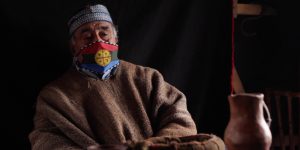
Local mutation imaginaries. Mapuche Culture Workshop.
As part of the celebration of the “Año Nuevo en el Sur” (Southern New Year), the Laboratory of Visual Anthropology of the Museological Direction, is conducting Workshops on Mapuche Culture taught by David Rain Canicura, peumatufe (the authority that guides the direction and decision-making of the community based on dreams) and nguillatufe (the authority responsible for the ceremony of Nguillatun). The proposal of the Mutations program is to generate a pre-recorded workshop that will allow the Mapuche imaginary about mutations to be better understood, as well as the experience of Mapuche communities in the current pandemic.
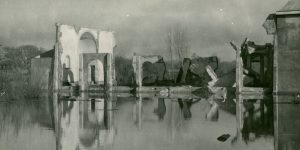
Telluric Mutations. The 1960 earthquake.
On May 22, 2020, 60 years since the largest seismic catastrophe ever recorded in the world was commemorated, a catastrophe whose epicenter was the city of Valdivia. The event had profound landscape, social, economic and cultural consequences for the affected cities and territories. The earthquake was a complex heritage where catastrophe and community resilience converge. The activity of the Austral Garden program is to share the series of initiatives prepared by the Museological Direction of Universidad Austral de Chile.
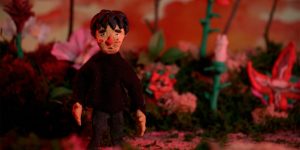
Prix Ars Electronica u19–create your world
Die diesjährige u19-Ausstellung lädt alle Gewinner*innen ein, Ideen und Projekte miteinander auszutauschen. Ihre „Homebase“ ist die physische Ausstellung der Projekte, wo sie diese anderen Künstler*innen und dem Publikum erläutern können. Sie lassen andere an ihren Talenten teilhaben und präsentieren dem Publikum des Ars Electronica Festival ihre Sicht auf mögliche Zukunftsszenarien.
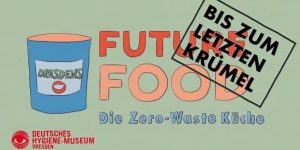
Dresden’s Future Food. Zero Waste Edition – To the Last Crumb
No idea what to do with old bread or the leaves of radish? In three short tutorials, learn how to prepare a delicious starter, main course and dessert by using seasonal and regional ingredients. Part of the Deutsche Hygiene-Museum’s digital “Future Food. What will we eat tomorrow?” program. In cooperation with Commerzbank Foundation.
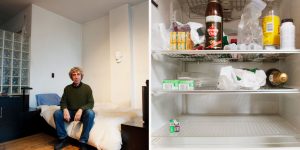
Virtual tour through the exhibition “Future Food. What will we eat tomorrow?”
Visitors can virtually explore the special exhibition Future Food. What will we eat tomorrow? that is held at the Deutsche Hygiene-Museum Dresden from May 2020 to Feb 2021. The exhibition takes up on one of the most urgent questions of the 21st century: how can we create the future of food facing the global challenges?
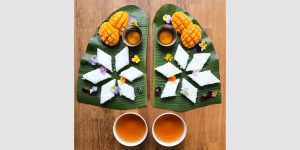
How do regional food systems work?
In times of multiple crises, the issue of food security is vividly debated. The panel discussion addresses opportunities and challenges of regional food production and supply with a focus on Dresden, Saxony.


